 |
|
 |
 |
 |
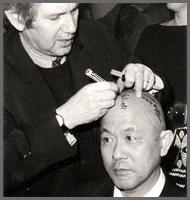 |
| Emeritus Professor at Kyoto University of Education
Chairman at Takarazuka University of Art and Design
President of Able Art Japan (Japanese Association for Disabled Artists)
President and founder of AU (Art Unidentified), a group of over 200 Japanese artists who create works without any limitations or constraint (Unidentified Art)
|
On the left: Ben Voitier
On the right: Shozo Shimamoto |
|
|
 |
| 1954 |
Founds Gutai with Jiro YOSHIHARA and proposes the name GUTAI which means gconcreteh. Participates in the most important Gutai Exhibitions. |
| 1955 |
At the first Gutai Exhibition he presents a revolutionary work to be experienced and enjoyed by the body: gPlease, walk on hereh. The work was reconstructed in 1993 and the original version is shown on the page of
gworksh. |
| 1956 |
On occasion of the Gutai Open-air Exhibition he shows his work realized through the use of a handmade cannon. He conceives the technique that will be presented at the Venice Biennale in 1993, whereby glass bottles containing pigment are thrown and explode the paint directly onto canvas |
| 1957 |
Shows his pioneering art video at the Performance Gutai Exhibition.
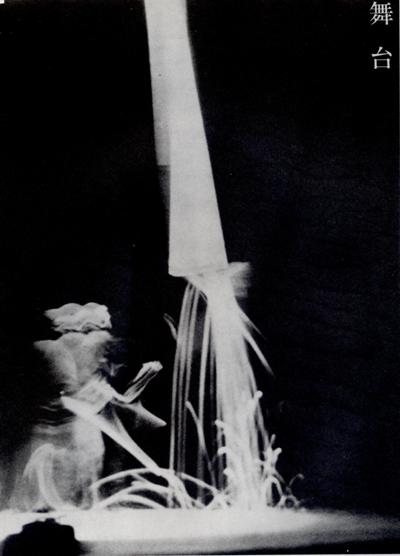
Another of his works, a sound piece which can be considered as Concrete Music , is included in the Pompidou Center Collection
|
| 1970 |
He acts as art producer for 1000 brides at the EXPO Festival |
| 1976 |
Participates in a Mail Art
project involving 60 countries and featuring a network of 8000
exchanges.
Creates a road by laying 10000 newspapers along Mukogawa river side
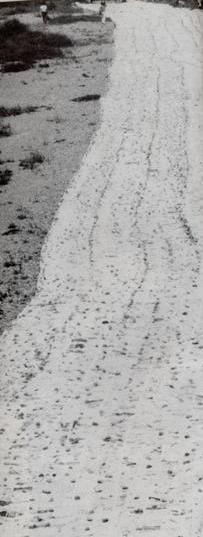
@
|
| 1992 |
While he continues to produce new works, he also takes the role of president of Japan Art and Culture Society of Disabled-person (now Able Art Japan) and organizes the first large scale exhibition by disabled people in Osaka
In the same year he is interviewed by Jane Kennedy Smith for the most famous Japanese newspaper, Mainichi Shinbun
|
| 1993 |
Invited to participate at Venice Biennale as a member of Gutai |
| 1994 |
Invited to exhibit at Guggenheim (New York) |
| 1996 |
Shimamoto is proposed as a candidate for the Nobel Prize for Peace in recognition of his numerous pacifist activities since meeting Bern Porter, the physician who made the nuclear bomb dropped on Hiroshima |
| 1997 |
He is the only Japanese artist since the Meiji Restoration to have his photo included in Art History, published by America Albums
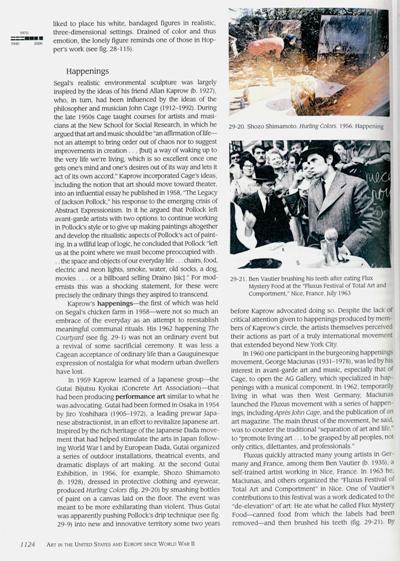
@
|
| 1998 |
He is invited as one of the first four best artists of the world from the post-war, along with Jackson Pollock, John Cage and Lucio Fontana, to participate in an exhibition at MOCA (US)
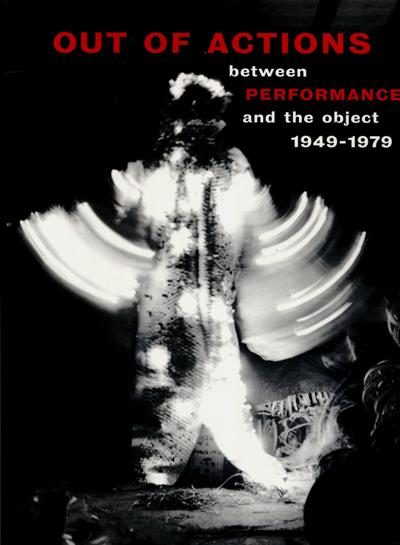 @@@ @@@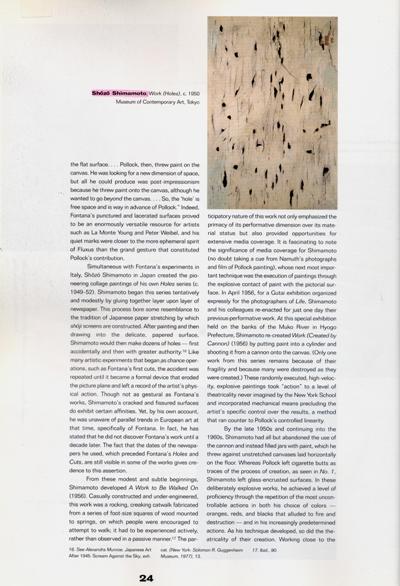
@
|
| 1999 |
He is invited once again to participate at Venice Biennale, with David Bowie and Yoko Ono |
| 2000 |
He holds an exhibition in Paris (Unesco) and proposes a Collaboration Art in France co-sponsored by Unesco of Japan and the Museum
Felissimo.
He begins creating a huge work that will be preserved for 100 years in Shin Nishinomiya ( Hyogo Prefecture )
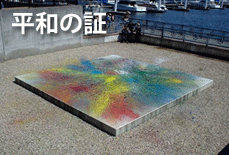
@ |
| 2001 |
He is invited to the Japan Year event in London . Some artworks are assigned to the Tate Modern, becoming the earliest non-white artist's work to be included in the collection |
| 2003 |
Invited to participate at the Venice Biennale (Extra 50) |
| 2004 |
Performance using a helicopter near Venice .
Nyotaku performance at Ca' Pesaro International Gallery of Modern Art ( Venice ). Three works now belong to the gallery's collection. |
| 2005 |
Helicopter performance
in Trevi and exhibition at Trevi Flash Art Museum.
Solo exhibition in Reggio Emilia (Pari & Dispari Agency, Italy).
Realization of the smallest art work in the world, using
nanotechnology in order to make pictures on the tips of the bristles
of a toothbrush (in collaboration with Ritsumeikan University of
Kyoto) |
| 2006 |
Invited to exhibit at
ZONE ZERO in Duesseldorf. Invited to exhibit at
Hsinchu City International Glass Art Festival 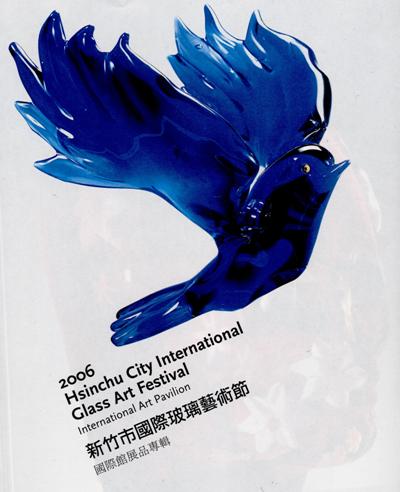
.
Solo Exhibition and crane performance in Napoli. Invited
to exhibit at Tokyo International Art Fair. |
| Tokyo Contemporary Art Museum, Fukuoka Prefecture Art Museum, Kitakyushu Museum, Hyogo Prefecture Art Museum, Osaka Modern Art Museum, Nara Museum, Takamatsu Art Museum, Ashiya Art Museum, Miyagi Prefecture Art Museum, Shizuoka Prefecture Art Museum , Gifu Prefecture Art Museum , Osaka Contemporary Art Museum , etc. |
Tate Modern (London), National Museum of Modern Art of Rome, Art Center of Milan, Paris Gallery, Mail Art Museum (Bern, Swiss), Ca' Pesaro International Gallery of Modern Art (Venice), etc. |
|
 |